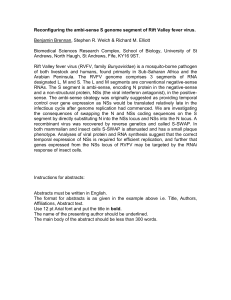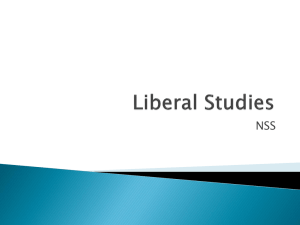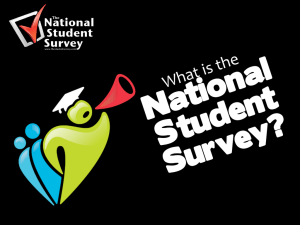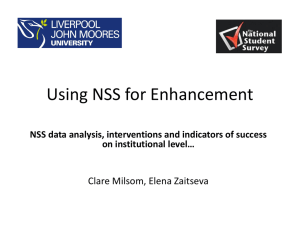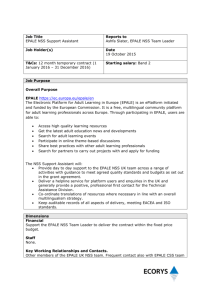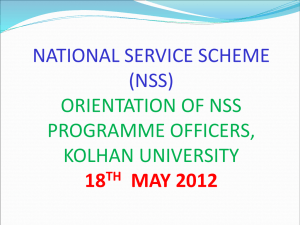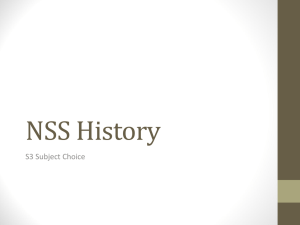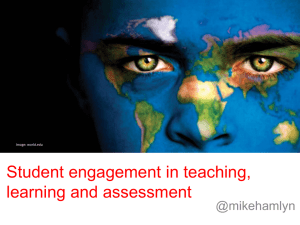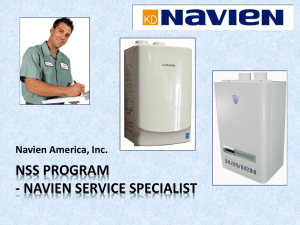Educational Development and the NSS
advertisement
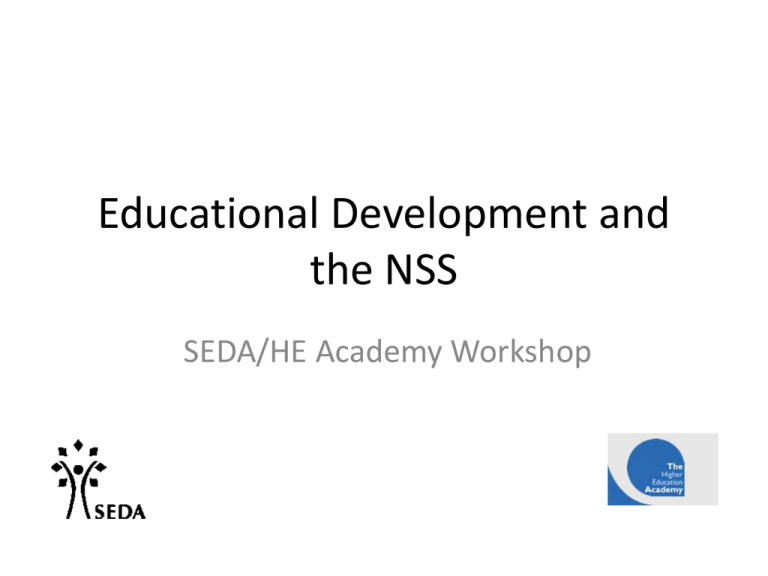
Educational Development and the NSS SEDA/HE Academy Workshop Aims of this session • To consider the context required for NSS outputs to contribute to teaching enhancement • To explore the conceptual models at play when educational developers respond to NSS issues with academic staff • To share how educational developers might work best to enhance teaching, using the NSS NSS as a trigger for change? • Concern for benchmark position (as a university or across a programme or department) • An indicator of a ‘problem’ from the students’ perspective • As above – from the perspective of academic staff • An opportunity to evaluate an earlier change initiative • Educational developers available to act as critical friends, advisors, facilitators But.. Some questions to consider: • Do people, departments, universities care about the bench mark position? • Are people convinced that that the NSS is a valid tool for uncovering student experiences? • Is anyone interested in evaluating an earlier change project? • Are educational developers able to respond in a helpful way? Process relies on: o Senior managers who care about NSS outcomes and communicate this o Students who expect to be involved in dialogue about the NSS o All of above despite possible reservations about validity of tool o University mechanisms which link to NSS outcomes o The role of the EDU Q 1. What structures does the NSS link to in your university? For example, annual reviews, promotion evidence, departmental quality reviews, reports to committees? Do people care about NSS? Dialogue with current students A discussion point at appraisal Evidence of the student experience An indicator to be analysed in the course annual review An action point in a department plan Evidence for rewards or promotions An action plan to be considered at individual or course level A goal in institutional strategy A national benchmark Educational developers and the NSS • The role of the Educational developer in relation to student evaluation data • The nature of EDU work in relation to student evaluation data • The possibilities and challenges Who are you when you are working with academics on the NSS? The non neutrality of some of the mental models Davies (1975) – consulting relationships are either product or process orientated Product mode – client has solution in mind and consultant assists. The client may ‘purchase’ advice or resources from a ‘seller’. There may be external coercion to do this and an economy in which to operate. Something is lacking until the transaction when balance is restored. Process mode – consultant engages the client in problem solving. Can be a deficit model – the client has a problem, is sick and the consultant can make a diagnosis and resolve the problem. Even co-enquiry model may not feel neutral Espoused and perceived methods of working • When I am working well with an academic team it’s like what? • Is your espoused model the same as the model you actually use? Q.2. What might an academic team be thinking when the educational developer comes to work with them on the NSS? How is the unit seen? • Too linked to senior management and managerial agendas? • The providers of hints and tips for teaching? • Critical friends? • Colleagues? • The pedagogic gurus? • The commissars? • Who? Implications of the evaluation instrument • There may be implicit values / ideological stances embedded in an instrument like the NSS (student satisfaction not student engagement for example) • It might result in perverse outcomes through a focus on crude measures of satisfaction • The values and mental models of the educational developer will influence the way the tool is used • The values and mental models of the academic team / individuals will influence the way the tool can be used to enhance teaching SEDA Values • An understanding of how people learn • Scholarship, professionalism and ethical practice • Working and developing learning communities • Working effectively with diversity and promoting inclusivity • Continuing reflection on professional practice • Developing people and processes Using the NSS to change views about teaching • A tool for reflection – offering an opportunity to benchmark and a student view of the teams’ practice and a basis for action research, including student focus groups to triangulate data (Biggs 1999) • A mechanism for providing a pedagogic threshold concept – ‘there may thus be a transformed internal view of subject matter, subject landscape, or even world view, and the teacher can move on’ (Meyer and Land 2005) • A lever for changing behaviour– change institutional, departmental, course or individual level practice and beliefs will follow (Guskey 1986) • Evidence of enhancement – a crude measure but one nonetheless of enhancement work or strategic actions • A ‘way in’ to a dialogic space with academics and academic teams –for transformative dialogue (Kester 2004) Development and Change ‘Development’ may be viewed as a site for contest: it is not a unitary concept for which one day, we will provide a model. The very meaning of the word ‘development’, how it is constituted, the kind of activities it implies, are all discursive, and can be interpreted according to various ontological and epistemological standpoints Webb 1996 But doesn’t that make our job so interesting?! references Biggs, J (1990)Teaching for Quality Learning at University SRHE Davies, I (1975) Some aspects of a theory of advice: the management of an instructional developer-client relationship. Instructional Science 3, 351-373 Guskey, T (1986) Staff development and the process of teacher change, Educational Researcher 15 (5) 5-12 Kester G 2004 Conversation Pieces Meyer, JHF and Shanahan, M (2003) The Troublesome Nature of a Threshold Concept in Economics, Paper presented to the 10th Conference of the European Association for Research on Learning and Instruction (EARLI), Padua, Italy, August 26-30. Perkins, D (1999) The Many Faces of Constructivism, Educational Leadership, Volume 57, Number 3, November Perkins, D (2005) The underlying game: troublesome knowledge and threshold conceptions, in Meyer, J.H.F and Land, R. (eds) Overcoming Barriers to Student Understanding: Threshold Concepts and Troublesome Knowledge . Webb G (1996) Understanding Staff Development SRHE Wenger, E (1998) Communities of Practice: Learning, Meaning and Identity. Cambridge: Cambridge University Press.

